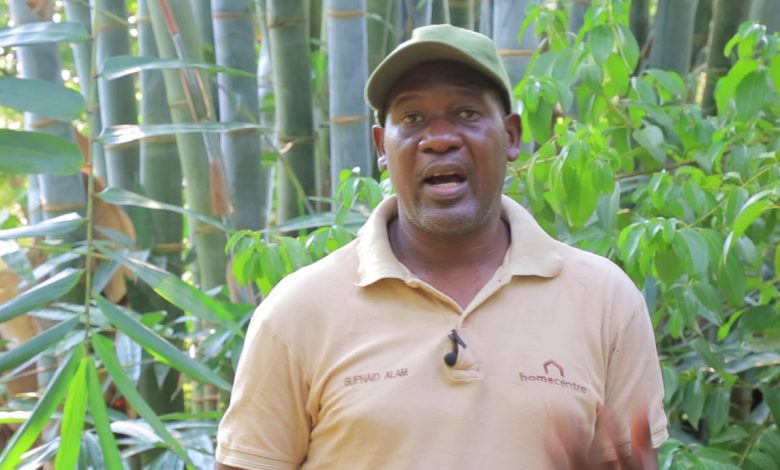Lessons from China inspire Ugandan to lead flourishing bamboo business
As the world marks the annual International Day of Forests, which falls on March 21, Ndawula and his peers argue that growing bamboo should be prioritized as forest tree cover is quickly depleting.

Deep in rural central Uganda in Nakaseke district, Andrew Kalema Ndawula tends to his lush green bamboo forest, a road that he says will lead to not only wealth but also environmental benefits in a country where deforestation is at its peak.
As the world marks the annual International Day of Forests, which falls on March 21, Ndawula and his peers argue that growing bamboo should be prioritized as forest tree cover is quickly depleting.
State-run National Environment Management Authority said although the country has registered better forest cover in recent years, there are also increasing cases of illegal logging and forest destruction by encroachers. The country’s net forest cover gain rose from 9 percent in 2017 to 13 percent in 2020.
Environmental activists argued that the activities of people like Ndawula are critical in efforts to restore lost tree cover.
Ndawula’s turning point was after a 2012 trip to the Chinese capital Beijing, where he was among a group that had training in bamboo management for two months.
“Later, we went for fieldwork in Quanzhou and learned how bamboo can transform a country,” Ndawula told Xinhua in a recent interview.
“We visited a place near the Yangtze River where the lives of seven million people are tagged to bamboo. I told myself, this could also work in Uganda,” he said.
On returning home, Ndawula was excited to start a new journey of bamboo growing. In 2013, he started his own nursery farm with 150,000 seedlings. This has since grown into 53,000 hectares of bamboo under his farm called Talent Agro-Forestry Farm.
While in China, Ndawula said he learned more about utilizing bamboo for different purposes.
“We visited textile industries where they are making high-quality clothes from bamboo. It was amazing. You can get 10,000 products out of bamboo. It is your imagination that limits you. You have to look at your demands,” he said.
Ndawula said after the training in China and practical implementation of what he learned, bamboo was a magic bullet for fighting joblessness and deforestation. He said unlike other trees, such as pine, when you do selective harvesting of bamboo, the shoots keep coming up all the time.
“So, a bamboo canopy is always there. With pine, when you are harvesting, you do the clear-cutting, and it will take you another 10 years before you recover the canopy,” Ndawula said.
He argued that bamboo plantations can provide income-generating opportunities for households.
“We have a problem of unemployment in Uganda, and we have a problem of deforestation. We can actually use bamboo as a raw material to create cottage industries, which can provide jobs to millions of youth,” Ndawula said.
“Bamboo is a good investment as a passive source of income. In one year, a clamp can give you 100 poles. If you sell each pole at one U.S. dollar and you are getting 100 poles from one clamp in a year, that is 100 dollars. There are not many crops that will give you that kind of returns,” he said.
He said he planted 100 seedlings in 2012, and up to date, he was still harvesting. There are no signs that these clamps are going anywhere anytime soon, he noted.
At the farm, Ndawula has been passing on skills to youth from universities and other institutions of learning.
“We believe that by convincing the youth that there is a future in bamboo, we will be promoting bamboo growing. We train them in sustainable management, value addition, and propagation. They become our ambassadors because their minds are open. They are eager to learn new things, and they are very innovative,” he said.
Charity Tezira, a student of landscaping and compound design at the Community Integrated Development Initiative Institute, said her understanding of bamboo was widened during her stay at the farm as an intern.
“We came here to learn how to use bamboo in landscaping. I have learned more things, such as making vinegar, fertilizers, and other products from bamboo,” she said.
Elizabeth Kiwummulo, another intern, said she has discovered that bamboo was more than mere grass. “Bamboo can be medicinal, you can make herbal soap from it, and it can also be used as a fertilizer,” she said.
“It is a plant with multiple functions. I encourage people to plant bamboo. It can provide material for building, animal feed, and human consumption,” Kiwummulo said.
In recent years, bamboo products have continued to gain prominence in Uganda. Some private companies have started adding value by packaging bamboo shoots, which is a traditional delicacy among the Bagisu people in eastern Uganda.
Other innovative entrepreneurs are making bamboo bicycle frames which fetch revenue on the international market.



